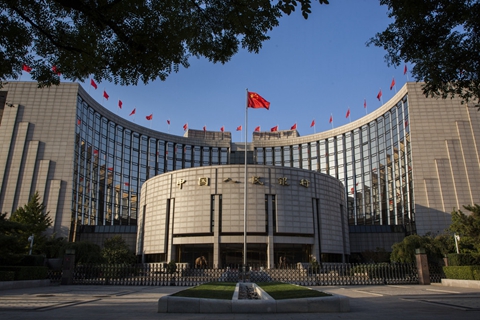Debate Over China’s Fiscal Policy Heats Up as Growth Slows

* Xu’s comments sparked heated market discussion as it is rare in China for a senior monetary official to openly criticize fiscal policy
* Some economists have suggested that China should fine-tune its monetary and fiscal policies in the face of the economy’s growing complexity
The chief researcher for China’s central bank criticized the nation’s fiscal policy as inadequate to support economic growth, setting off a rare public debate between the country’s top monetary and fiscal policy makers.
Xu Zhong, director-general of the research bureau of the People’s Bank of China, in a speech Friday criticized fiscal policy for failing to play the “countercyclical role” of bolstering economic growth, particularly at a time when the central government is pushing to deleverage the financial sector and rein in local government debt.
“There is ample room for fiscal policy, but evidence shows that the policy is not being implemented actively enough,” Xu said. Fiscal policy involves spending and taxation as set by central and local governments while monetary policy refers to interest rates and money supply as determined by central banks. Both kinds of policymaking affect economic growth and inflation.
An official of the Ministry of Finance, which oversees fiscal policy, disputed Xu’s comments, though the ministry itself didn’t publicly respond.
Xu’s comments sparked heated market discussion as it is rare in China for a senior monetary official to openly criticize fiscal policy. Some market analysts said it signaled an attempt by the central bank to press fiscal departments to shoulder more responsibility for balancing the economy.
The episode also reflects the growing challenges facing China to coordinate policies amid the pressures of slowing growth and tightening liquidity under the prolonged deleveraging campaign.
After expanding at 10% or so much of the past two decades, China’s economy is growing more slowly. Economic growth decelerated to 6.7% year-on-year in the second quarter — the slowest since the third quarter of 2016 — as government-led infrastructure spending declined, official data showed on Monday.
In an update of its World Economic Outlook posted Monday, the International Monetary Fund projected China’s GDP growth at 6.6% for all of this year, before slowing to 6.4% in 2019.
Some economists have suggested that China should fine-tune its monetary and fiscal policies in the face of the economy’s growing complexity. Authorities have reiterated that China would maintain a proactive fiscal policy while implementing a prudent and neutral monetary policy.
Liu Shangxi, head of the Finance Ministry-linked Chinese Academy of Fiscal Sciences, argued Friday that fiscal policy at the current stage should be more predictable and forward-looking than just being expansionary, given the increasing economic uncertainties both within the country and abroad.
China’s budget deficit goal this year is 2.6% of GDP, indicating a contractionary fiscal policy compared with last year’s 3%, Xu said in the speech, which was later published by Caixin (link in Chinese). Xu also criticized China’s budget policies for a lack of transparency, saying that even he has trouble understanding government budget reports.
An official of the Ministry of Finance published an article (link in Chinese) Monday in Caixin to rebut Xu’s comments, saying that the budget deficit is not a precise way to measure fiscal policy.
“Regardless of the budget deficit figures, fiscal departments have expanded active fiscal policies through various measures in practice,” the official wrote, using the pseudonym Qingchi and asserting that the article represents only personal opinion.
In the Friday speech, Xu also criticized fiscal department rules that disconnect local governments from the responsibility to repay borrowing by state-owned enterprises and local government financing vehicles that is often implicitly guaranteed by governments.
“Such moves may lead to moral hazard, lowering local authorities’ willingness to pay off debt, which would pass the fiscal risks to the financial sector, give rise to bad loans, and even trigger systemic risks,” Xu said.
However, the pseudonymous writer Qingchi said financial institutions should take more responsibility for their role in fueling local governments’ borrowing.
“Financial institutions have been involved in every stage of local governments’ irregular borrowing activities,” Qingchi wrote. “The complexity of their operations exceeded the capability of local government departments. Some financial institutions are so powerful that they force local governments to offer loan guarantees and violate rules.”
Xu also argued that fiscal departments should use fiscal funds to replenish the capital of state-owned financial institutions and ease the strain of financial market deleveraging. Xu said the government has failed to inject new capital in many state companies. For instance, banks have replenished their capital through the issuance of “special government treasuries” with the assistance of the central bank, rather than receiving actual funds from state coffers, Xu said.
But Qingchi said it is “unprofessional” to say that fiscal departments didn’t pay out actual money to support state companies as government spending is subject to more limits and should take into account the impact on market liquidity.
Fiscal departments and the central bank should perform their own duties, clearly define their responsibilities, and not intervene in each other’s responsibilities, Qingchi said.
Contact reporter Han Wei (weihan@caixin.com)

- 1Cover Story: China Carves Out a Narrow Path for Offshore Asset Tokenization
- 2Drownings Shake Chinese Enthusiasm for Travel to Russia
- 3China Business Uncovered Podcast: A $15 Billion Bitcoin Seizure and the Fall of a Cybercrime Kingpin
- 4Over Half of China’s Provinces Cut Revenue Targets
- 5Li Ka-Shing’s Port Empire Hit by Forced Takeover Amid Panama Legal Dispute
- 1Power To The People: Pintec Serves A Booming Consumer Class
- 2Largest hotel group in Europe accepts UnionPay
- 3UnionPay mobile QuickPass debuts in Hong Kong
- 4UnionPay International launches premium catering privilege U Dining Collection
- 5UnionPay International’s U Plan has covered over 1600 stores overseas






